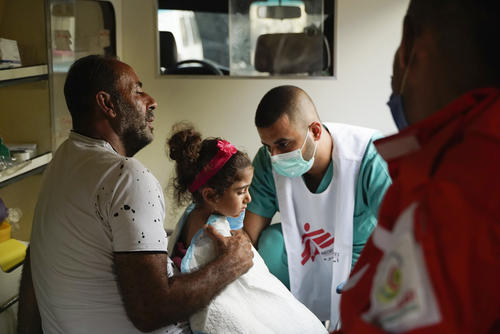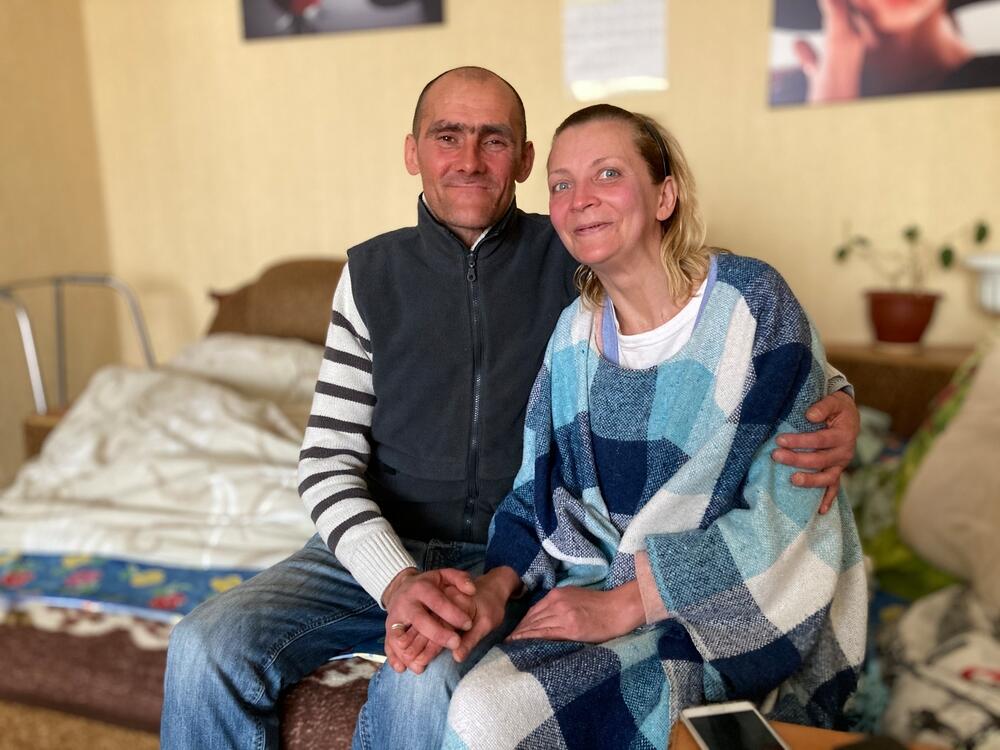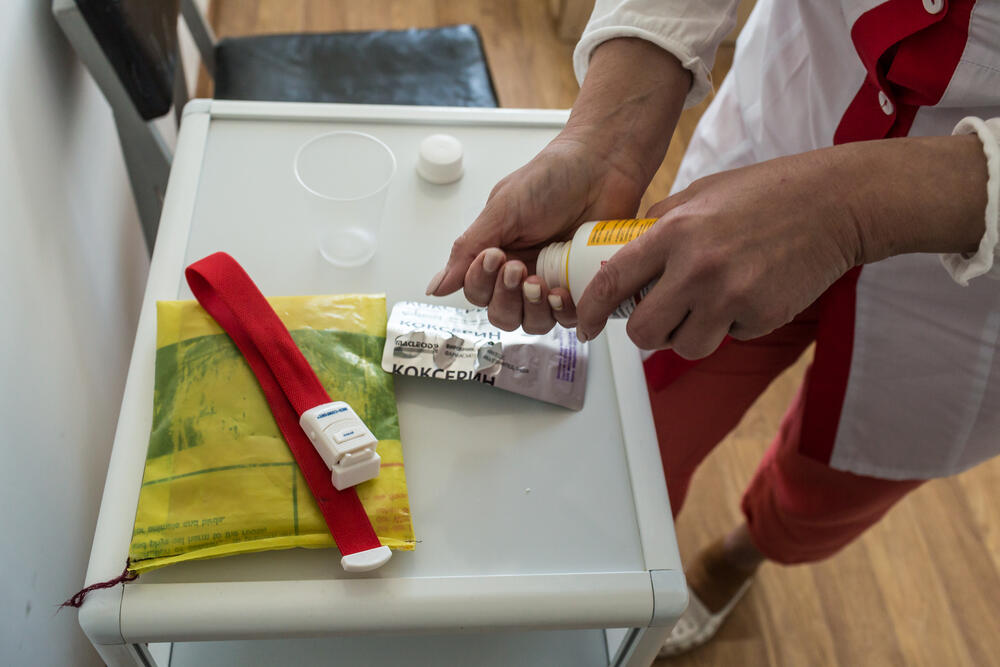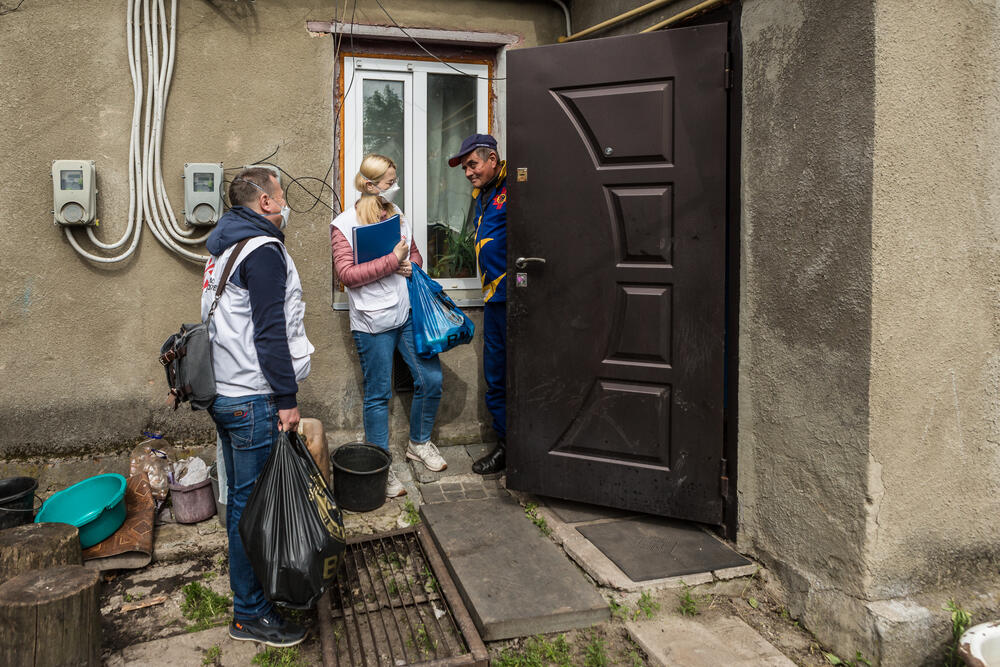Tuberculosis: Love and other cures in Ukraine
Little did Sergey realise that a trip to the fridge would become a life-changing moment.
On that early August morning in Ukraine last year, a groggy 40-year-old Sergey met Natasha. Unknown to him at the time, he had just met his future wife.
Finding love was unexpected, and came in the least likely of all places – the regional tuberculosis (TB) dispensary in Zhytomyr, a city 87 miles west of the capital Kyiv.
Back in 2001, Sergey had been suffering from pneumonia and sepsis in his lungs.
“I was diagnosed with TB. What made it more difficult was that I was also addicted to drugs,” explains Sergey.
“Things were tough. I was in and out of prison, my wife had died from TB and alcohol addiction, and I had lost custody of my son.”
“I used to wake up at five or six in the morning due to stomach cramps and I would cry at the sight of those pills. It was really difficult.”
In 2020, a chance encounter with Médecins Sans Frontières / Doctors Without Borders (MSF) social worker Vitaliy convinced Sergey to enter a treatment programme for patients with multidrug-resistant tuberculosis (MDR-TB) – a strain of the illness that does not respond to usual antibiotics.
The programme was supported by the regional TB dispensary in Zhytomyr and MSF.
A tough treatment
Despite an overhaul of the policies around TB, until a few years ago patients in Ukraine had to spend 12 to 24 months inside dedicated TB healthcare facilities.
The treatment for drug-resistant forms of TB is not easy to withstand, requiring daily injections and combinations of drugs that can result in moderate to severe side effects ranging from tiredness to neurological conditions.
The prolonged hospital stay also comes at a cost: separating a patient from their family and community and often resulting in the loss of their job and income.
TB survivors like Sergey – a former prisoner with a history of substance use – occupy the lowest ranks of the socio-economic hierarchies in Ukraine and are often unable to start or complete such a long hospital stay for TB treatment without support.
“The [TB] drugs impacted my hearing and eyesight; I lost my appetite and consequently a lot of weight,” says Sergey.
“I used to wake up at five or six in the morning due to stomach cramps and I would cry at the sight of those pills. It was really difficult.”

Get closer to the Frontline
Get the latest news, stories and updates, straight to your inbox.
In numbers: Our work on tuberculosis
1,300,000
TB DEATHS IN 2022
17,800
PEOPLE STARTED ON FIRST-LINE TREATMENT FOR TB BY MSF IN 2022
2,695
PEOPLE STARTED ON MULTI DRUG-RESISTANT TB TREATMENT IN 2023
His partner Natasha leans into his chest, and tightens her palm around his. She has a similar story.
“I had a history of substance addiction and my then partner was an alcoholic,” she explains.
“In 2007, I tested positive for HIV and lost parental rights to my two children. Later that year, I contracted pneumonia, which doctors initially diagnosed as an infection but later as TB.
“I managed to get treatment but contracted TB again in 2009, and later MDR-TB twice in 2016 and 2020.”
The problem of drug resistance
When patients are unable to complete their full TB treatment, it poses a serious risk and is linked with the emergence of drug-resistant forms of the disease.
According to the World Health Organisation, in 2018 the proportion of drug-resistant cases among newly confirmed TB patients in Ukraine was 29 percent, and 46 percent among previously treated patients. This rate is high in comparison with other European countries and has become a significant public health challenge.
The regional TB dispensary aims to reverse this trend through a research programme supported by MSF.
The study promotes a "patient-centred" approach by showcasing the advantages offered by shorter treatment plans (lasting between nine and 12 months) and highly effective all-oral medications such as Bedaquiline and Delamanid – drugs that cause fewer severe side effects than older TB medications.
Many patients in this programme also receive treatment for other conditions like hepatitis C, HIV and alcohol or substance-use disorders.
Putting patients first
This patient-centred approach also prioritises the individual needs of people receiving care.
“When I entered the MSF programme in Zhytomyr, I was struggling,” says Sergey.
“I was craving drugs all the time but I also wanted to get my life back – get a job, apply for disability status so my medical expenses could be covered. As part of my treatment here, I also started methadone substitution therapy.
“But when I met Natasha, that’s when I felt God freed me,” he adds, smiling.
Part of this approach is the vital strengthening of outpatient care, so patients can stay with their families and friends while receiving treatment. We know that being able to return home and still continue their medication increases the chance of a patient completing their full course of care.
To help achieve this, MSF has put together patient support teams that include nurses, social workers and psychologists. They work with MDR-TB patients to understand and overcome any potential barriers to their care, ranging from unpaid pensions to a lack of heating in their homes.
Hope for the future
“I want to tell my story because I am alive," says Natasha.
"TB patients are lost to society. People around us don’t understand. We are told we won’t find a job. But I want to tell health authorities that we need nutritious food, healthcare workers to treat us well and social workers to listen to our needs."
Discharged from the regional TB dispensary in October 2020, Sergey and Natasha got married that December. They completed their treatment in January 2021. Today, they dream of building a house with a small garden and buying a car to travel the world.
“In 2007, I was diagnosed with TB and HIV and I thought I was going to die,” summarises Sergey.
“Then I saw a poster of a child under a sunflower which said ‘Life goes on’. That gave me hope. Today, I am alive”.
Can I donate to support MSF's work in Ukraine?
Thanks to the generosity of people like you donating to our general funds, we haven't needed to launch an appeal for our work in Ukraine and surrounding countries.
Please consider giving an unrestricted donation, which will give our medical teams across the world the valuable flexibility to respond as needs arise.
Visit the following page to learn more.
Please visit the following link should you wish to donate to our general funds.
MSF and tuberculosis
Tuberculosis (TB) is a deadly infectious disease. Every year, over 10 million people develop active TB and 1.6 million die from it.
TB is often thought of as a disease of the past but a recent resurgence and the spread of drug-resistant forms make it very much an issue of the present day and age.
Almost half a million people develop multidrug-resistant strains of the disease every year. Today, TB is one of the three main killer infectious diseases, along with malaria and HIV/AIDS.


